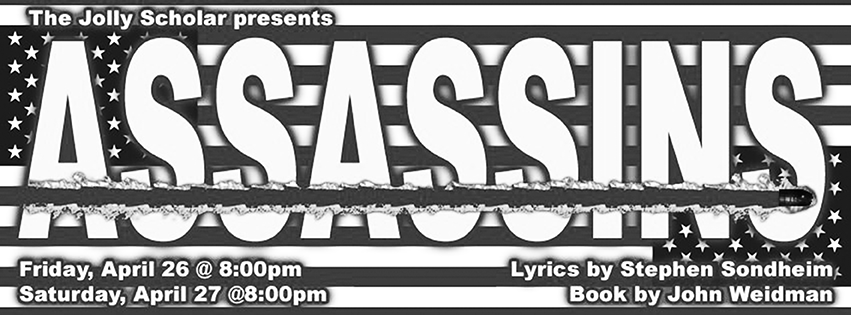John Wilkes Booth walks into a bar with Lee Harvey Oswald, John Hinckley, Sara Jane Moore, and Leon Czolgosz. What does Booth do? Being the infamous assassin that he is, he influences the others to follow his footsteps and be forever remembered as killers, even if they don’t succeed.
That bar is the Jolly Scholar tonight and tomorrow, Saturday April 27, when Stephen Sondheim’s famous musical “Assassins” hits the main stage, or bench, or seat. And the story may begin by Booth taking the seat next to you.
“This may be the first time that Case Western Reserve University has had a dinner theatre production,” said director Mike Suglio. “This is a completely unique experience because we utilize the space in full.”
“You’ll never see a show like this anywhere else,” continued Suglio.
And he’s right: the Jolly Scholar is a unique space indeed, even for a bar. But imagine a near 40-person cast, pit, and staff for a musical in the space as well, not to mention the amount of evil infiltrating everyone involved.
“We don’t often get the opportunity to be truly despicable human beings, and it doesn’t affect the rest of our lives,” said Andrew Deike, CWRU alumnus and actor who portrays John Wilkes Booth.
Michael Knobloch, who acts as Lee Harvey Oswald, agreed. “We see these people as villains, but the show gives a background as to who they may have been.”
Sometimes the actors had to figure out who they are on stage. Alexis Attinoto plays Sara Jane Moore, the attempted assassin of president Gerald Ford, and had only a small description of her character: very little is known about her other than her foiled plot and her life afterwards. She then had to imagine: what was she like? What drove her to try to kill? Characters like the Proprietor and the Balladeer try to lead the audience to answer these questions.
The Proprietor sells each assassin the gun he or she uses to kill while the Balladeer attempts to act as “the voice of reason,” said Knobloch, who also plays both with conviction. But why should one person play these dichotic personalities?
“[Suglio] wanted to cast the same person in these two roles to juxtapose each other,” said Knobloch. Each vignette features an assassin battling their desire to kill in order to be heard, and while the Proprietor gave them the means to do so, the Balladeer tries to convince them otherwise. Then Booth “tips each [character] over the edge,” said Deike.
“Each assassin, in their respective time, feels… like an outsider. Booth gives them the answer [to their problems]: ‘Kill the president,’” he said. Booth set this precedent by killing Abraham Lincoln, the first assassinated head of the United States.
Transcending time and place, the musical brings together the influences and aftermaths of these killers, forever in the minds of citizens for what they did. Without them, some of our most beloved presidents may not have been as loved as they are. They may have been remembered completely differently.
“Assassins” is full of contrasts, and the music embodies this. At an emotional pivot point of the play, Booth toys with the thought of killing himself. Right after he commits suicide, the music immediately becomes a ragtime jingle, making the audience feel upbeat after the disturbing event.
To learn more about the negative figures emblazoned in history books forever, come to the Jolly Scholar at 7 p.m. to order food and drink in time for the show to begin. Tickets are on sale at the restaurant and bar from 11 a.m. to 2 p.m. today, as well as at the door and on the Facebook event page.
Not only is this a great end to the semester, but you also receive a 10 percent discount of your entire bill for attending. The production will be hosting an after-party at the venue on both nights, so come early, stay late, and enjoy a great piece of theatre made possible by an enthusiastic and incredibly talented cast and crew.


